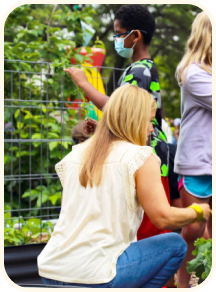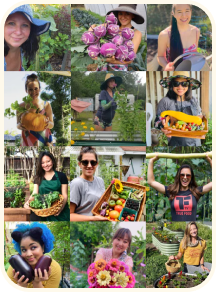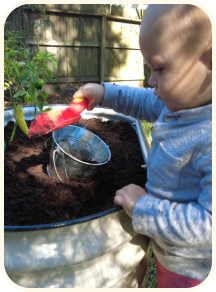Skip to content
Whether you’re a beginner or an experienced gardener, seed starting is a salient way to grow your plants. Starting from seeds offer many benefits including greater control over variety, larger selection, and more consistent quality. With renewed interest in seed catalogs due to the pandemic, it is wise to start ordering your seeds now before they sell out. This article explores how to pick out the perfect seeds for your garden and what factors to consider.
Terms to Understand When browsing seed catalogs, you may have noticed terminology such as genetically modified, heirloom, and open pollinated on the seed packets. Below are some common terms to review, their definitions, and their implications for gardening.
Genetically modified (GM): GM or GMO seeds are bioengineered in a laboratory using modern technology techniques like gene splicing to achieve certain characteristics. The major crops that are genetically modified are corn, wheat, cotton, and soybeans. GMO seeds are not commercially available to the general public.
Open-pollinated: Open-pollinated seeds are seeds that are self-pollinated or cross-pollinated by birds, wind, insects, or other natural forces. OP varieties tend to grow true to seed if no cross-pollinations occur, with substantially similar genetic characteristics as that of the parent plant. They are preferred by gardeners who seek to save their own seeds.
Heirloom: Heirlooms are open-pollinated cultivars that have been passed down through generations. If you appreciate seed heritage and diversity, you can choose to grow heirloom varieties, which often contain a distinct flavor and higher nutrients. Research has shown that newer vegetables are significantly less nutritious than heirlooms. It is recommended that you grow heirlooms suited to your area, as they have been bred to adapt to the climate. While tomatoes are the most common heirloom, squash, peppers, eggplant, and corn are also grown. The disadvantages are that they are more susceptible to pests and disease, so you need to be vigilant when monitoring them.
Advantages:
Increased diversity of shapes, sizes and colors Preservation of history Better flavor and higher nutrition content
Hybrid : Hybrids are produced by artificially cross-pollinating two different varieties of plants of the same species to typically produce improved traits, such as higher yield, improved color or greater uniformity. Only recently has the issue of flavor been addressed. As they do not breed true without years of extensive work, they are usually not saved for gardening, and gardeners will have to purchase new seeds.
Advantages:
More likely to produce a yield with larger fruit Easier and faster to grow, disease resistant
May have better storage properties
Direct Sowing: Direct sowing is when seeds are planted directly into the soil, rather than started early indoors or as transplants. Those with delicate root systems do not like to be disturbed and prefer to be directly seeded in the ground. A variety of crops including beans, peas, zucchini, most root crops, and leafy greens are easy to grow from seed outdoors. To figure out which crops should be directly sown, consult your garden catalog or do research online.
Hardening off: Hardening off is to gradually acclimate seedlings to outdoor conditions before transplanting. Generally, move them outside for a couple of hours each day, gradually increasing until they can be left outdoors overnight. After 1 – 2 weeks of this procedure, you can begin transplanting your seedlings outdoors.
Certified Organic: Certified organic is a label given to seeds or plants grown using certified organic farming methods that comply with specific regulations. While many brands can use the label ‘organic,’ only a few are actually certified organic. Gardeners should aim to buy organic seeds for both environmental and ethical reasons. Organic seeds are more environmentally friendly, healthier, and less toxic. By buying organic seeds, you also support organic seed farmers and enhance the local economy.
How to Select Seeds for your Garden
Figure out what you want to grow
Although this may seem simple, it is important to figure out what you want to eat, and plan accordingly. If you are a beginner, you should consider growing easy to maintain vegetables such as tomatoes, potatoes, lettuce, onions and garlic. Other factors you should consider are the nutritional content, seed type, and your budget.
Consider your space
When planning out where to grow your vegetables, it is useful to figure out what you can grow in your space. If you are faced with space constraints, consider growing your crops in raised garden beds , which have optimal drainage properties to allow for higher yields in a smaller space. Available in many different sizes, styles, and materials, raised garden beds can be placed almost anywhere, from the backyard to patio or even balcony.
Browse seed catalogs
Once you have begun planning out your garden layout, you can begin perusing seed catalogs for inspiration and ideas. Whether you prefer print or online, seed catalogs are both educational and entertaining ways for you to expand your knowledge. The Almanac has a list of US catalogs you can check out. Paper catalogs are fun and relaxing to shift through, with beautiful pictures that evoke a sense of nostalgia for rustic retreats and idyllic, bygone days.
Don’t overbuy seeds
You may be compelled to buy an overabundance of seeds after being attracted by the glossy photos and fanciful descriptions, but that is not a good idea. Seeds will eventually expire and may become forgotten. It is recommended that you draw or plot a diagram of your plants to ensure that you will not waste money on seeds you don’t have space for.
Where to Buy Seeds
You may be curious about what companies to buy from, especially if you are a beginner. To save you time, below is a list of companies that offer seeds you can consider, depending on your availability of space, crop preference, and climate.
Botanical Interests : Botanical Interests feature picturesque depictions of plants that emulate the whimsicality of traditional print catalogs. Ideal for organic gardeners, they do not carry any GMO products and have a good selection of certified organic seeds. Their prices are also affordable, so be on the lookout for them in your local garden center or nursery.
Baker Creek Heirloom Seeds : If you are looking for an innovative experience, consider trying Baker Creek Heirloom seeds. They offer unique varieties of plants including lemon drop watermelon, mini blue popcorn, and white soul alpine strawberry. Ideal for heirloom gardeners or those willing to spend more money on specialty options.
Fedco Seeds : Based in the cool northeast, this company specializes in cold hardy vegetables such as potatoes, lettuce, and onions, making them ideal for those that live in demanding climates. They are a cooperative, which means they do not have an individual owner or beneficiary, instead owned by consumers and worker members, who earn profits through dividends. Although their website may not be as polished as some of the others, they offer low prices and are knowledgeable.
Pinetree Garden Seeds : Located in rural Maine, Pinetree is a small, family-owned operation founded in 1979 that has since expanded to offer over 1300 varieties of seeds. In addition to seeds, many of which are heirlooms and organics, they also offer tools and gardening gear, books, live plants, and soap making / crafting supplies. Ideal for those who want to harness their creativity or want to learn new ways to integrate vegetables into their cooking.
About Vego
At Vego Garden, our goal is to redefine Raised Garden Beds. The company was founded with the goal of launching a
modular metal garden bed system with a 20+ year life expectancy, utilizing eco- friendly metal materials instead
of cutting down trees. We emphasize innovative design and high quality with our products. The name vego carries
the spirit of DIY modular raised beds suitable for growing vegetables.
Read More >>
Get A 5% OFF + Free Shipping*
Be the first to know about our discounts, and get $15 off your next order of $199 + free shipping
Get Your Coupon
Please enable JavaScript to view the
comments powered by Disqus.
About Vego
At Vego Garden, our goal is to redefine Raised Garden Beds. The company was founded with the goal of launching a
modular metal garden bed system with a 20+ year life expectancy, utilizing eco- friendly metal materials instead
of cutting down trees. We emphasize innovative design and high quality with our products. The name vego carries
the spirit of DIY modular raised beds suitable for growing vegetables.
Read More >>
Get A 5% OFF + Free Shipping*
Be the first to know about our discounts, and get $15 off your next order of $199 + free shipping
Get Your Coupon
{"39495389741091":{"discounted":true,"percent":true,"caCompareAtPrice":32995},"39495389773859":{"discounted":true,"percent":true,"caCompareAtPrice":32995},"39495389806627":{"discounted":true,"percent":true,"caCompareAtPrice":32995},"39495389839395":{"discounted":true,"percent":true,"caCompareAtPrice":32995},"39573841346595":{"discounted":true,"percent":true,"caCompareAtPrice":60295.00000000001},"39569223417891":{"discounted":true,"percent":true,"caCompareAtPrice":75395},"39573841379363":{"discounted":true,"percent":true,"caCompareAtPrice":60295.00000000001},"39569223450659":{"discounted":true,"percent":true,"caCompareAtPrice":75395},"39573841412131":{"discounted":true,"percent":true,"caCompareAtPrice":60295.00000000001},"39569223483427":{"discounted":true,"percent":true,"caCompareAtPrice":75395},"39573841444899":{"discounted":true,"percent":true,"caCompareAtPrice":60295.00000000001},"39569223516195":{"discounted":true,"percent":true,"caCompareAtPrice":75395},"40120774852643":{"discounted":true,"percent":true,"caCompareAtPrice":60295.00000000001},"40120774885411":{"discounted":true,"percent":true,"caCompareAtPrice":75395},"40120774918179":{"discounted":true,"percent":true,"caCompareAtPrice":60295.00000000001},"40120774950947":{"discounted":true,"percent":true,"caCompareAtPrice":75395},"40120774983715":{"discounted":true,"percent":true,"caCompareAtPrice":60295.00000000001},"40120775016483":{"discounted":true,"percent":true,"caCompareAtPrice":75395},"40120775049251":{"discounted":true,"percent":true,"caCompareAtPrice":60295.00000000001},"40120775082019":{"discounted":true,"percent":true,"caCompareAtPrice":75395},"39458935832611":{"discounted":true,"percent":true,"caCompareAtPrice":68495},"39458935767075":{"discounted":true,"percent":true,"caCompareAtPrice":68495},"39458935865379":{"discounted":true,"percent":true,"caCompareAtPrice":68495},"39458935799843":{"discounted":true,"percent":true,"caCompareAtPrice":68495},"39903464947747":{"discounted":true,"percent":true,"caCompareAtPrice":16495},"39903464980515":{"discounted":true,"percent":true,"caCompareAtPrice":16495},"39903465046051":{"discounted":true,"percent":true,"caCompareAtPrice":16495},"39903465013283":{"discounted":true,"percent":true,"caCompareAtPrice":16495},"39903480250403":{"discounted":true,"percent":true,"caCompareAtPrice":13695},"39903480152099":{"discounted":true,"percent":true,"caCompareAtPrice":13695},"39903480184867":{"discounted":true,"percent":true,"caCompareAtPrice":13695},"39903480217635":{"discounted":true,"percent":true,"caCompareAtPrice":13695},"39903467896867":{"discounted":true,"percent":true,"caCompareAtPrice":24695},"39903467962403":{"discounted":true,"percent":true,"caCompareAtPrice":24695},"39903467995171":{"discounted":true,"percent":true,"caCompareAtPrice":24695},"39903467929635":{"discounted":true,"percent":true,"caCompareAtPrice":24695},"39458936389667":{"discounted":true,"percent":true,"caCompareAtPrice":78095},"39458936324131":{"discounted":true,"percent":true,"caCompareAtPrice":78095},"39458936422435":{"discounted":true,"percent":true,"caCompareAtPrice":78095},"39458936356899":{"discounted":true,"percent":true,"caCompareAtPrice":78095},"33028107501603":{"discounted":true,"percent":true,"caCompareAtPrice":29995},"39279009136675":{"discounted":true,"percent":true,"caCompareAtPrice":29995},"39279009169443":{"discounted":true,"percent":true,"caCompareAtPrice":29995},"33028107534371":{"discounted":true,"percent":true,"caCompareAtPrice":29995},"40149904130083":{"discounted":true,"percent":true,"caCompareAtPrice":29995},"40157716578339":{"discounted":true,"percent":true,"caCompareAtPrice":29995},"40229600591907":{"discounted":true,"percent":true,"caCompareAtPrice":29995},"33028104650787":{"discounted":true,"percent":true,"caCompareAtPrice":36995},"39509370765347":{"discounted":true,"percent":true,"caCompareAtPrice":36995},"39279430959139":{"discounted":true,"percent":true,"caCompareAtPrice":36995},"39509370863651":{"discounted":true,"percent":true,"caCompareAtPrice":36995},"33028104683555":{"discounted":true,"percent":true,"caCompareAtPrice":36995},"39509370798115":{"discounted":true,"percent":true,"caCompareAtPrice":36995},"39279430893603":{"discounted":true,"percent":true,"caCompareAtPrice":36995},"39509370830883":{"discounted":true,"percent":true,"caCompareAtPrice":36995},"40149955215395":{"discounted":true,"percent":true,"caCompareAtPrice":38995},"40149961637923":{"discounted":true,"percent":true,"caCompareAtPrice":36995},"40157728243747":{"discounted":true,"percent":true,"caCompareAtPrice":38995},"40157728276515":{"discounted":true,"percent":true,"caCompareAtPrice":36995},"40231723794467":{"discounted":true,"percent":true,"caCompareAtPrice":38995},"40231723827235":{"discounted":true,"percent":true,"caCompareAtPrice":36995},"39903477334051":{"discounted":true,"percent":true,"caCompareAtPrice":30195},"39903477366819":{"discounted":true,"percent":true,"caCompareAtPrice":31595},"39903477399587":{"discounted":true,"percent":true,"caCompareAtPrice":30195},"39903477432355":{"discounted":true,"percent":true,"caCompareAtPrice":31595},"39903477465123":{"discounted":true,"percent":true,"caCompareAtPrice":30195},"39903477497891":{"discounted":true,"percent":true,"caCompareAtPrice":31595},"39903477530659":{"discounted":true,"percent":true,"caCompareAtPrice":30195},"39903477563427":{"discounted":true,"percent":true,"caCompareAtPrice":31595},"39302886096931":{"discounted":true,"percent":true,"caCompareAtPrice":26095},"39302886031395":{"discounted":true,"percent":true,"caCompareAtPrice":26095},"39302885998627":{"discounted":true,"percent":true,"caCompareAtPrice":26095},"39302886064163":{"discounted":true,"percent":true,"caCompareAtPrice":26095},"39457200799779":{"discounted":true,"percent":true,"caCompareAtPrice":36995},"39457200734243":{"discounted":true,"percent":true,"caCompareAtPrice":36995},"39457200832547":{"discounted":true,"percent":true,"caCompareAtPrice":36995},"39457200767011":{"discounted":true,"percent":true,"caCompareAtPrice":36995},"39903460065315":{"discounted":true,"percent":true,"caCompareAtPrice":19195},"39903460098083":{"discounted":true,"percent":true,"caCompareAtPrice":19195},"39903460163619":{"discounted":true,"percent":true,"caCompareAtPrice":19195},"39903460130851":{"discounted":true,"percent":true,"caCompareAtPrice":19195},"33018842087459":{"discounted":true,"percent":true,"caCompareAtPrice":26095},"39279001403427":{"discounted":true,"percent":true,"caCompareAtPrice":26095},"33018842120227":{"discounted":true,"percent":true,"caCompareAtPrice":32995},"39278877605923":{"discounted":true,"percent":true,"caCompareAtPrice":32995},"40149905244195":{"discounted":true,"percent":true,"caCompareAtPrice":32995},"40157718347811":{"discounted":true,"percent":true,"caCompareAtPrice":32995},"40229606555683":{"discounted":true,"percent":true,"caCompareAtPrice":32995},"39490604466211":{"discounted":true,"percent":true,"caCompareAtPrice":20595},"39490604498979":{"discounted":true,"percent":true,"caCompareAtPrice":20595},"39490604564515":{"discounted":true,"percent":true,"caCompareAtPrice":20595},"39490604531747":{"discounted":true,"percent":true,"caCompareAtPrice":20595},"40149901279267":{"discounted":true,"percent":true,"caCompareAtPrice":20595},"40157715431459":{"discounted":true,"percent":true,"caCompareAtPrice":20595},"39948202377251":{"discounted":true,"percent":true,"caCompareAtPrice":30195},"39948202410019":{"discounted":true,"percent":true,"caCompareAtPrice":30195},"39948202311715":{"discounted":true,"percent":true,"caCompareAtPrice":30195},"39948202344483":{"discounted":true,"percent":true,"caCompareAtPrice":30195},"39253770141731":{"discounted":true,"percent":true,"caCompareAtPrice":27495},"39253770174499":{"discounted":true,"percent":true,"caCompareAtPrice":27495},"39253770240035":{"discounted":true,"percent":true,"caCompareAtPrice":27495},"39253770207267":{"discounted":true,"percent":true,"caCompareAtPrice":27495},"39569227382819":{"discounted":true,"percent":true,"caCompareAtPrice":27395},"39569227415587":{"discounted":true,"percent":true,"caCompareAtPrice":27395},"39569227448355":{"discounted":true,"percent":true,"caCompareAtPrice":27395},"39569227481123":{"discounted":true,"percent":true,"caCompareAtPrice":27395},"40073502097443":{"discounted":true,"percent":true,"caCompareAtPrice":48795},"40073502130211":{"discounted":true,"percent":true,"caCompareAtPrice":48795},"40073502162979":{"discounted":true,"percent":true,"caCompareAtPrice":48795},"40073502195747":{"discounted":true,"percent":true,"caCompareAtPrice":48795},"39490596012067":{"discounted":true,"percent":true,"caCompareAtPrice":31595},"39490596044835":{"discounted":true,"percent":true,"caCompareAtPrice":31595},"39490595979299":{"discounted":true,"percent":true,"caCompareAtPrice":31595},"39490595946531":{"discounted":true,"percent":true,"caCompareAtPrice":31595},"40149985001507":{"discounted":true,"percent":true,"caCompareAtPrice":31595},"40157713072163":{"discounted":true,"percent":true,"caCompareAtPrice":31595},"33042263932963":{"discounted":true,"percent":true,"caCompareAtPrice":45295},"33042263965731":{"discounted":true,"percent":true,"caCompareAtPrice":45295},"39278875476003":{"discounted":true,"percent":true,"caCompareAtPrice":45295},"39279009792035":{"discounted":true,"percent":true,"caCompareAtPrice":45295},"40149988737059":{"discounted":true,"percent":true,"caCompareAtPrice":45295},"40157717430307":{"discounted":true,"percent":true,"caCompareAtPrice":45295},"40538642743331":{"discounted":true,"percent":true,"caCompareAtPrice":45295},"32893235068963":{"discounted":true,"percent":true,"caCompareAtPrice":21995},"39359510183971":{"discounted":true,"percent":true,"caCompareAtPrice":21995},"39359510380579":{"discounted":true,"percent":true,"caCompareAtPrice":21995},"39359509626915":{"discounted":true,"percent":true,"caCompareAtPrice":21995},"39302847758371":{"discounted":true,"percent":true,"caCompareAtPrice":20595},"33033504161827":{"discounted":true,"percent":true,"caCompareAtPrice":20595},"39302847266851":{"discounted":true,"percent":true,"caCompareAtPrice":20595},"39302847528995":{"discounted":true,"percent":true,"caCompareAtPrice":20595},"39458927509539":{"discounted":true,"percent":true,"caCompareAtPrice":50695},"39458927444003":{"discounted":true,"percent":true,"caCompareAtPrice":50695},"39458927542307":{"discounted":true,"percent":true,"caCompareAtPrice":50695},"39458927476771":{"discounted":true,"percent":true,"caCompareAtPrice":50695},"39457181958179":{"discounted":true,"percent":true,"caCompareAtPrice":50695},"39457181892643":{"discounted":true,"percent":true,"caCompareAtPrice":50695},"39457181990947":{"discounted":true,"percent":true,"caCompareAtPrice":50695},"39457181925411":{"discounted":true,"percent":true,"caCompareAtPrice":50695},"33042261409827":{"discounted":true,"percent":true,"caCompareAtPrice":38495},"33042261442595":{"discounted":true,"percent":true,"caCompareAtPrice":38495},"39279010742307":{"discounted":true,"percent":true,"caCompareAtPrice":38495},"39279010709539":{"discounted":true,"percent":true,"caCompareAtPrice":38495},"40149986869283":{"discounted":true,"percent":true,"caCompareAtPrice":38495},"40157715529763":{"discounted":true,"percent":true,"caCompareAtPrice":38495},"40538642415651":{"discounted":true,"percent":true,"caCompareAtPrice":38495},"33031990509603":{"discounted":true,"percent":true,"caCompareAtPrice":49995},"39509882863651":{"discounted":true,"percent":true,"caCompareAtPrice":49995},"33031990542371":{"discounted":true,"percent":true,"caCompareAtPrice":49995},"39509882896419":{"discounted":true,"percent":true,"caCompareAtPrice":49995},"39279016345635":{"discounted":true,"percent":true,"caCompareAtPrice":49995},"39509882961955":{"discounted":true,"percent":true,"caCompareAtPrice":49995},"39279016476707":{"discounted":true,"percent":true,"caCompareAtPrice":49995},"39509882929187":{"discounted":true,"percent":true,"caCompareAtPrice":49995},"40149997027363":{"discounted":true,"percent":true,"caCompareAtPrice":49995},"40149998632995":{"discounted":true,"percent":true,"caCompareAtPrice":49995},"40157720936483":{"discounted":true,"percent":true,"caCompareAtPrice":49995},"40157734404131":{"discounted":true,"percent":true,"caCompareAtPrice":49995},"40536780111907":{"discounted":true,"percent":true,"caCompareAtPrice":49995},"39887154577443":{"discounted":true,"percent":true,"caCompareAtPrice":9695},"39593915875363":{"discounted":true,"percent":true,"caCompareAtPrice":2795},"39593915908131":{"discounted":true,"percent":true,"caCompareAtPrice":2795},"39593953296419":{"discounted":true,"percent":true,"caCompareAtPrice":2795},"39593953329187":{"discounted":true,"percent":true,"caCompareAtPrice":2795},"39612941565987":{"discounted":true,"percent":true,"caCompareAtPrice":16495},"39917388333091":{"discounted":true,"percent":true},"39917388365859":{"discounted":true,"percent":true},"39917390135331":{"discounted":true,"percent":true},"39917390168099":{"discounted":true,"percent":true},"39913389490211":{"discounted":true,"percent":true},"39917388398627":{"discounted":true,"percent":true},"39917388431395":{"discounted":true,"percent":true},"39917390200867":{"discounted":true,"percent":true},"40612116004899":{"discounted":true,"percent":true},"40612116037667":{"discounted":true,"percent":true},"39913593077795":{"discounted":true,"percent":true,"caCompareAtPrice":6895},"39913593110563":{"discounted":true,"percent":true,"caCompareAtPrice":9695},"39913593143331":{"discounted":true,"percent":true,"caCompareAtPrice":15195},"39917346193443":{"discounted":true,"percent":true,"caCompareAtPrice":23395},"39663128346659":{"discounted":true,"percent":true},"39663128379427":{"discounted":true,"percent":true},"39922332631075":{"discounted":true,"percent":true,"caCompareAtPrice":6895},"39922332663843":{"discounted":true,"percent":true,"caCompareAtPrice":6895},"39922340003875":{"discounted":true,"percent":true,"caCompareAtPrice":11095},"39922340036643":{"discounted":true,"percent":true,"caCompareAtPrice":11095},"39922340069411":{"discounted":true,"percent":true,"caCompareAtPrice":11095},"39705961496611":{"discounted":true,"percent":true,"caCompareAtPrice":4195},"39705961529379":{"discounted":true,"percent":true,"caCompareAtPrice":5595},"39705961562147":{"discounted":true,"percent":true,"caCompareAtPrice":8295},"39926582870051":{"discounted":true,"percent":true,"caCompareAtPrice":13795},"39869961764899":{"discounted":true,"percent":true,"caCompareAtPrice":6895},"39869961797667":{"discounted":true,"percent":true,"caCompareAtPrice":11095},"39869961830435":{"discounted":true,"percent":true,"caCompareAtPrice":15195},"39936031031331":{"discounted":true,"percent":true,"caCompareAtPrice":17895},"39705945800739":{"discounted":true,"percent":true,"caCompareAtPrice":9695},"39705945767971":{"discounted":true,"percent":true,"caCompareAtPrice":6895},"39705945833507":{"discounted":true,"percent":true,"caCompareAtPrice":13795},"39917346848803":{"discounted":true,"percent":true,"caCompareAtPrice":21995},"39569227644963":{"discounted":true,"percent":true,"caCompareAtPrice":39795},"39569227677731":{"discounted":true,"percent":true,"caCompareAtPrice":39795},"39569227710499":{"discounted":true,"percent":true,"caCompareAtPrice":39795},"39569227743267":{"discounted":true,"percent":true,"caCompareAtPrice":39795},"40006276382755":{"discounted":true,"percent":true,"caCompareAtPrice":36995},"40006276546595":{"discounted":true,"percent":true,"caCompareAtPrice":36995},"40006276775971":{"discounted":true,"percent":true,"caCompareAtPrice":36995},"40006276939811":{"discounted":true,"percent":true,"caCompareAtPrice":36995},"40024456036387":{"discounted":true,"percent":true,"caCompareAtPrice":9595},"40024461049891":{"discounted":true,"percent":true,"caCompareAtPrice":17895},"40021598797859":{"discounted":true,"percent":true,"caCompareAtPrice":9695},"40039271923747":{"discounted":true,"percent":true,"caCompareAtPrice":6895},"40039271956515":{"discounted":true,"percent":true,"caCompareAtPrice":6895},"40039271989283":{"discounted":true,"percent":true,"caCompareAtPrice":6895},"40039272022051":{"discounted":true,"percent":true,"caCompareAtPrice":6895},"40049744576547":{"discounted":true,"percent":true},"40049744609315":{"discounted":true,"percent":true},"40163199975459":{"discounted":true,"percent":true,"caCompareAtPrice":6895},"40163200008227":{"discounted":true,"percent":true,"caCompareAtPrice":6895},"40163199942691":{"discounted":true,"percent":true,"caCompareAtPrice":6895},"40201956589603":{"discounted":true,"percent":true,"caCompareAtPrice":6800},"40201956622371":{"discounted":true,"percent":true,"caCompareAtPrice":8200},"40195291480099":{"discounted":true,"percent":true},"40202236526627":{"discounted":true,"percent":true},"40202236559395":{"discounted":true,"percent":true},"40196235591715":{"discounted":true,"percent":true,"caCompareAtPrice":45295},"40202232037411":{"discounted":true,"percent":true,"caCompareAtPrice":45295},"40202232070179":{"discounted":true,"percent":true,"caCompareAtPrice":45295},"40195093495843":{"discounted":true,"percent":true,"caCompareAtPrice":57595.00000000001},"40202231152675":{"discounted":true,"percent":true,"caCompareAtPrice":57595.00000000001},"40202231185443":{"discounted":true,"percent":true,"caCompareAtPrice":57595.00000000001},"40195095560227":{"discounted":true,"percent":true,"caCompareAtPrice":42495},"40202231447587":{"discounted":true,"percent":true,"caCompareAtPrice":42495},"40202231480355":{"discounted":true,"percent":true,"caCompareAtPrice":42495},"40195099328547":{"discounted":true,"percent":true,"caCompareAtPrice":60295.00000000001},"40202229121059":{"discounted":true,"percent":true,"caCompareAtPrice":60295.00000000001},"40202229153827":{"discounted":true,"percent":true,"caCompareAtPrice":60295.00000000001},"40195099688995":{"discounted":true,"percent":true,"caCompareAtPrice":75395},"40202233937955":{"discounted":true,"percent":true,"caCompareAtPrice":75395},"40202233970723":{"discounted":true,"percent":true,"caCompareAtPrice":75395},"40195100639267":{"discounted":true,"percent":true,"caCompareAtPrice":75395},"40202233151523":{"discounted":true,"percent":true,"caCompareAtPrice":75395},"40202233184291":{"discounted":true,"percent":true,"caCompareAtPrice":75395},"40195240755235":{"discounted":true,"percent":true,"caCompareAtPrice":87695},"40202231283747":{"discounted":true,"percent":true,"caCompareAtPrice":87695},"40202231316515":{"discounted":true,"percent":true,"caCompareAtPrice":87695},"40195260317731":{"discounted":true,"percent":true,"caCompareAtPrice":72695},"40202231873571":{"discounted":true,"percent":true,"caCompareAtPrice":72695},"40202231906339":{"discounted":true,"percent":true,"caCompareAtPrice":72695},"40195273064483":{"discounted":true,"percent":true,"caCompareAtPrice":90495},"40202230857763":{"discounted":true,"percent":true,"caCompareAtPrice":90495},"40202230890531":{"discounted":true,"percent":true,"caCompareAtPrice":90495},"40195346268195":{"discounted":true,"percent":true},"40202236657699":{"discounted":true,"percent":true},"40202236690467":{"discounted":true,"percent":true},"40195281846307":{"discounted":true,"percent":true,"caCompareAtPrice":120595},"40202235969571":{"discounted":true,"percent":true,"caCompareAtPrice":120595},"40202236002339":{"discounted":true,"percent":true,"caCompareAtPrice":120595},"40006833799203":{"discounted":true,"percent":true,"caCompareAtPrice":42495},"40021991882787":{"discounted":true,"percent":true,"caCompareAtPrice":53095.00000000001},"40006833831971":{"discounted":true,"percent":true,"caCompareAtPrice":42495},"40021991948323":{"discounted":true,"percent":true,"caCompareAtPrice":53095.00000000001},"40006833864739":{"discounted":true,"percent":true,"caCompareAtPrice":42495},"40021992013859":{"discounted":true,"percent":true,"caCompareAtPrice":53095.00000000001},"40006833897507":{"discounted":true,"percent":true,"caCompareAtPrice":42495},"40021992079395":{"discounted":true,"percent":true,"caCompareAtPrice":53095.00000000001},"40134115852323":{"discounted":true,"percent":true,"caCompareAtPrice":28395},"40134115885091":{"discounted":true,"percent":true,"caCompareAtPrice":18195},"40134115917859":{"discounted":true,"percent":true,"caCompareAtPrice":26995},"40134115950627":{"discounted":true,"percent":true,"caCompareAtPrice":32095},"40134115983395":{"discounted":true,"percent":true,"caCompareAtPrice":22495},"40134116016163":{"discounted":true,"percent":true,"caCompareAtPrice":25295},"40134116048931":{"discounted":true,"percent":true,"caCompareAtPrice":26995},"40134116081699":{"discounted":true,"percent":true,"caCompareAtPrice":33595},"40134116114467":{"discounted":true,"percent":true,"caCompareAtPrice":37595},"40134116147235":{"discounted":true,"percent":true,"caCompareAtPrice":36295},"40134116180003":{"discounted":true,"percent":true,"caCompareAtPrice":37095},"40134116212771":{"discounted":true,"percent":true,"caCompareAtPrice":27895},"40134116245539":{"discounted":true,"percent":true,"caCompareAtPrice":27995},"40145521180707":{"discounted":true,"percent":true,"caCompareAtPrice":29395},"40233730211875":{"discounted":true,"percent":true,"caCompareAtPrice":800},"40233733259299":{"discounted":true,"percent":true,"caCompareAtPrice":800},"40233729851427":{"discounted":true,"percent":true,"caCompareAtPrice":800},"40233700491299":{"discounted":true,"percent":true,"caCompareAtPrice":800},"40233701376035":{"discounted":true,"percent":true,"caCompareAtPrice":800},"40233729753123":{"discounted":true,"percent":true,"caCompareAtPrice":800},"40227788619811":{"discounted":true,"percent":true,"caCompareAtPrice":800},"40233730801699":{"discounted":true,"percent":true,"caCompareAtPrice":800},"40233696165923":{"discounted":true,"percent":true,"caCompareAtPrice":800},"40233691807779":{"discounted":true,"percent":true,"caCompareAtPrice":800},"40233733750819":{"discounted":true,"percent":true,"caCompareAtPrice":800},"40233731817507":{"discounted":true,"percent":true,"caCompareAtPrice":800},"40233730277411":{"discounted":true,"percent":true,"caCompareAtPrice":800},"40233734209571":{"discounted":true,"percent":true,"caCompareAtPrice":800},"40233730768931":{"discounted":true,"percent":true,"caCompareAtPrice":800},"40233733685283":{"discounted":true,"percent":true,"caCompareAtPrice":800},"40233733554211":{"discounted":true,"percent":true,"caCompareAtPrice":800},"40233782771747":{"discounted":true,"percent":true,"caCompareAtPrice":800},"40233733062691":{"discounted":true,"percent":true,"caCompareAtPrice":800},"40233722839075":{"discounted":true,"percent":true,"caCompareAtPrice":800},"40233732341795":{"discounted":true,"percent":true,"caCompareAtPrice":800},"40233782804515":{"discounted":true,"percent":true,"caCompareAtPrice":800},"40233745481763":{"discounted":true,"percent":true,"caCompareAtPrice":800},"40233782706211":{"discounted":true,"percent":true,"caCompareAtPrice":800},"40233776906275":{"discounted":true,"percent":true,"caCompareAtPrice":800},"40233737584675":{"discounted":true,"percent":true,"caCompareAtPrice":800},"40233779920931":{"discounted":true,"percent":true,"caCompareAtPrice":800},"40233701146659":{"discounted":true,"percent":true,"caCompareAtPrice":800},"40233730965539":{"discounted":true,"percent":true,"caCompareAtPrice":800},"40233733914659":{"discounted":true,"percent":true,"caCompareAtPrice":800},"40233698492451":{"discounted":true,"percent":true,"caCompareAtPrice":800},"40233720774691":{"discounted":true,"percent":true,"caCompareAtPrice":800},"40233698164771":{"discounted":true,"percent":true,"caCompareAtPrice":800},"40233707372579":{"discounted":true,"percent":true,"caCompareAtPrice":800},"40233730506787":{"discounted":true,"percent":true,"caCompareAtPrice":800},"40186969849891":{"discounted":true,"percent":true,"caCompareAtPrice":6895},"40186969882659":{"discounted":true,"percent":true,"caCompareAtPrice":9695},"40186969915427":{"discounted":true,"percent":true,"caCompareAtPrice":12395},"40186969948195":{"discounted":true,"percent":true,"caCompareAtPrice":15195},"39647044567075":{"discounted":true,"percent":true,"caCompareAtPrice":9695},"39647044599843":{"discounted":true,"percent":true,"caCompareAtPrice":16495},"40189384491043":{"discounted":true,"percent":true,"caCompareAtPrice":9695},"40189384523811":{"discounted":true,"percent":true,"caCompareAtPrice":16495},"40189384556579":{"discounted":true,"percent":true,"caCompareAtPrice":9695},"40189384589347":{"discounted":true,"percent":true,"caCompareAtPrice":16495},"40209225613347":{"discounted":true,"percent":true,"caCompareAtPrice":5595},"40251254669347":{"discounted":true,"percent":true,"caCompareAtPrice":9695},"40251276492835":{"discounted":true,"percent":true,"caCompareAtPrice":16495},"40251254702115":{"discounted":true,"percent":true,"caCompareAtPrice":9695},"40251276525603":{"discounted":true,"percent":true,"caCompareAtPrice":16495},"40251254734883":{"discounted":true,"percent":true,"caCompareAtPrice":9695},"40251276558371":{"discounted":true,"percent":true,"caCompareAtPrice":16495},"40251255128099":{"discounted":true,"percent":true,"caCompareAtPrice":5795},"40251276197923":{"discounted":true,"percent":true,"caCompareAtPrice":9695},"40251255160867":{"discounted":true,"percent":true,"caCompareAtPrice":5795},"40251276230691":{"discounted":true,"percent":true,"caCompareAtPrice":9695},"40251255193635":{"discounted":true,"percent":true,"caCompareAtPrice":5795},"40251276263459":{"discounted":true,"percent":true,"caCompareAtPrice":9695},"40246461726755":{"discounted":true,"percent":true,"caCompareAtPrice":17895},"40246461792291":{"discounted":true,"percent":true,"caCompareAtPrice":17895},"40246461759523":{"discounted":true,"percent":true,"caCompareAtPrice":17895},"40327621640227":{"discounted":true,"percent":true},"40329419194403":{"discounted":true,"percent":true,"caCompareAtPrice":3695},"40329419227171":{"discounted":true,"percent":true,"caCompareAtPrice":3695},"40329419259939":{"discounted":true,"percent":true,"caCompareAtPrice":3695},"40327767064611":{"discounted":true,"percent":true,"caCompareAtPrice":6395},"40313739903011":{"discounted":true,"percent":true},"40313740165155":{"discounted":true,"percent":true},"40313740197923":{"discounted":true,"percent":true},"40313730367523":{"discounted":true,"percent":true,"caCompareAtPrice":3695},"40313730498595":{"discounted":true,"percent":true,"caCompareAtPrice":4595},"40313739411491":{"discounted":true,"percent":true,"caCompareAtPrice":3695},"40313739444259":{"discounted":true,"percent":true,"caCompareAtPrice":4595},"40328147238947":{"discounted":true,"percent":true,"caCompareAtPrice":1895},"40328129282083":{"discounted":true,"percent":true,"caCompareAtPrice":2500},"40328147075107":{"discounted":true,"percent":true,"caCompareAtPrice":2795},"40328146747427":{"discounted":true,"percent":true,"caCompareAtPrice":2095},"40376049893411":{"discounted":true,"percent":true,"caCompareAtPrice":5195},"40376049926179":{"discounted":true,"percent":true,"caCompareAtPrice":5195},"40376049958947":{"discounted":true,"percent":true,"caCompareAtPrice":5195},"40331197972515":{"discounted":true,"percent":true,"caCompareAtPrice":8295},"40376060149795":{"discounted":true,"percent":true,"caCompareAtPrice":1895},"40331071422499":{"discounted":true,"percent":true,"caCompareAtPrice":3195},"40237290979363":{"discounted":true,"percent":true,"caCompareAtPrice":6895},"40237291012131":{"discounted":true,"percent":true,"caCompareAtPrice":12395},"40237291044899":{"discounted":true,"percent":true,"caCompareAtPrice":17895},"40237291077667":{"discounted":true,"percent":true,"caCompareAtPrice":21995},"40237295861795":{"discounted":true,"percent":true,"caCompareAtPrice":6895},"40237295927331":{"discounted":true,"percent":true,"caCompareAtPrice":12395},"40237295992867":{"discounted":true,"percent":true,"caCompareAtPrice":17895},"40237296058403":{"discounted":true,"percent":true,"caCompareAtPrice":21995},"40237295829027":{"discounted":true,"percent":true,"caCompareAtPrice":6895},"40237295894563":{"discounted":true,"percent":true,"caCompareAtPrice":12395},"40237295960099":{"discounted":true,"percent":true,"caCompareAtPrice":17895},"40237296025635":{"discounted":true,"percent":true,"caCompareAtPrice":21995},"40092513566755":{"discounted":true,"percent":true},"40446144512035":{"discounted":true,"percent":true},"40446144544803":{"discounted":true,"percent":true},"40446144577571":{"discounted":true,"percent":true},"40446144610339":{"discounted":true,"percent":true},"40446144643107":{"discounted":true,"percent":true},"40446144675875":{"discounted":true,"percent":true},"40446147035171":{"discounted":true,"percent":true,"caCompareAtPrice":43895},"40446147067939":{"discounted":true,"percent":true,"caCompareAtPrice":43895},"40446147100707":{"discounted":true,"percent":true,"caCompareAtPrice":43895},"40446147133475":{"discounted":true,"percent":true,"caCompareAtPrice":43895},"40446147166243":{"discounted":true,"percent":true,"caCompareAtPrice":43895},"40446147199011":{"discounted":true,"percent":true,"caCompareAtPrice":43895},"40446147231779":{"discounted":true,"percent":true,"caCompareAtPrice":43895},"40446145757219":{"discounted":true,"percent":true,"caCompareAtPrice":33195},"40446146412579":{"discounted":true,"percent":true,"caCompareAtPrice":33195},"40446145298467":{"discounted":true,"percent":true,"caCompareAtPrice":33195},"40451782246435":{"discounted":true,"percent":true,"caCompareAtPrice":45295},"40451782279203":{"discounted":true,"percent":true,"caCompareAtPrice":45295},"40451782311971":{"discounted":true,"percent":true,"caCompareAtPrice":45295},"40451782344739":{"discounted":true,"percent":true,"caCompareAtPrice":45295},"40294905085987":{"discounted":true,"percent":true,"caCompareAtPrice":24695},"40294905118755":{"discounted":true,"percent":true,"caCompareAtPrice":24695},"40294905053219":{"discounted":true,"percent":true,"caCompareAtPrice":24695},"40294905151523":{"discounted":true,"percent":true,"caCompareAtPrice":24695},"40294905184291":{"discounted":true,"percent":true,"caCompareAtPrice":24695},"40453863473187":{"discounted":true,"percent":true,"caCompareAtPrice":24695},"40295020134435":{"discounted":true,"percent":true,"caCompareAtPrice":36995},"40295020167203":{"discounted":true,"percent":true,"caCompareAtPrice":36995},"40295020101667":{"discounted":true,"percent":true,"caCompareAtPrice":36995},"40295020199971":{"discounted":true,"percent":true,"caCompareAtPrice":36995},"40295020232739":{"discounted":true,"percent":true,"caCompareAtPrice":36995},"40454193971235":{"discounted":true,"percent":true,"caCompareAtPrice":36995},"40294993756195":{"discounted":true,"percent":true,"caCompareAtPrice":27395},"40294993788963":{"discounted":true,"percent":true,"caCompareAtPrice":27395},"40294993723427":{"discounted":true,"percent":true,"caCompareAtPrice":27395},"40294993821731":{"discounted":true,"percent":true,"caCompareAtPrice":27395},"40294993854499":{"discounted":true,"percent":true,"caCompareAtPrice":27395},"40454190759971":{"discounted":true,"percent":true,"caCompareAtPrice":27395},"40468303413283":{"discounted":true,"percent":true},"40476567601187":{"discounted":true,"percent":true,"caCompareAtPrice":104195},"40476567633955":{"discounted":true,"percent":true,"caCompareAtPrice":104195},"40476567666723":{"discounted":true,"percent":true,"caCompareAtPrice":104195},"40476567699491":{"discounted":true,"percent":true,"caCompareAtPrice":104195},"40476567732259":{"discounted":true,"percent":true,"caCompareAtPrice":104195},"40476567765027":{"discounted":true,"percent":true,"caCompareAtPrice":104195},"40476567797795":{"discounted":true,"percent":true,"caCompareAtPrice":104195},"40481364148259":{"discounted":true,"percent":true},"40481363853347":{"discounted":true,"percent":true},"40481363755043":{"discounted":true,"percent":true},"40481362837539":{"discounted":true,"percent":true},"40481363623971":{"discounted":true,"percent":true},"40481363460131":{"discounted":true,"percent":true},"40481363132451":{"discounted":true,"percent":true},"40481363394595":{"discounted":true,"percent":true},"40481363066915":{"discounted":true,"percent":true},"40481362739235":{"discounted":true,"percent":true},"40481363230755":{"discounted":true,"percent":true},"40481363296291":{"discounted":true,"percent":true},"40481362935843":{"discounted":true,"percent":true},"40481362149411":{"discounted":true,"percent":true},"40481363787811":{"discounted":true,"percent":true},"40481363492899":{"discounted":true,"percent":true},"40481363427363":{"discounted":true,"percent":true},"40481363558435":{"discounted":true,"percent":true},"40481363165219":{"discounted":true,"percent":true},"40481363001379":{"discounted":true,"percent":true},"40481363099683":{"discounted":true,"percent":true},"40481363263523":{"discounted":true,"percent":true},"40481362673699":{"discounted":true,"percent":true},"40481362608163":{"discounted":true,"percent":true},"40481363034147":{"discounted":true,"percent":true},"40481362640931":{"discounted":true,"percent":true},"40481362477091":{"discounted":true,"percent":true},"40481362542627":{"discounted":true,"percent":true},"40481362870307":{"discounted":true,"percent":true},"40481362575395":{"discounted":true,"percent":true},"40481362903075":{"discounted":true,"percent":true},"40481362378787":{"discounted":true,"percent":true},"40481362411555":{"discounted":true,"percent":true},"40481362772003":{"discounted":true,"percent":true},"40481362444323":{"discounted":true,"percent":true},"40481362313251":{"discounted":true,"percent":true},"40481362116643":{"discounted":true,"percent":true},"40481362804771":{"discounted":true,"percent":true},"40481363197987":{"discounted":true,"percent":true},"40481363361827":{"discounted":true,"percent":true},"40481362247715":{"discounted":true,"percent":true},"40481362346019":{"discounted":true,"percent":true},"40481362509859":{"discounted":true,"percent":true},"40481362083875":{"discounted":true,"percent":true},"40481362018339":{"discounted":true,"percent":true},"40481362051107":{"discounted":true,"percent":true},"40481362182179":{"discounted":true,"percent":true},"40481362280483":{"discounted":true,"percent":true},"40481361756195":{"discounted":true,"percent":true},"40481361985571":{"discounted":true,"percent":true},"40481361952803":{"discounted":true,"percent":true},"40481361920035":{"discounted":true,"percent":true},"40481361854499":{"discounted":true,"percent":true},"40481361821731":{"discounted":true,"percent":true},"40481361625123":{"discounted":true,"percent":true},"40481361887267":{"discounted":true,"percent":true},"40481361690659":{"discounted":true,"percent":true},"40481361723427":{"discounted":true,"percent":true},"40481361526819":{"discounted":true,"percent":true},"39567814754339":{"discounted":true,"percent":true},"39567814688803":{"discounted":true,"percent":true},"39567814623267":{"discounted":true,"percent":true},"39567814557731":{"discounted":true,"percent":true},"39567814721571":{"discounted":true,"percent":true},"39567814656035":{"discounted":true,"percent":true},"39567814590499":{"discounted":true,"percent":true},"39567814524963":{"discounted":true,"percent":true},"40186969653283":{"discounted":true,"percent":true},"40186969686051":{"discounted":true,"percent":true},"39569207394339":{"discounted":true,"percent":true,"caCompareAtPrice":23295},"39569207558179":{"discounted":true,"percent":true,"caCompareAtPrice":39795},"39569207623715":{"discounted":true,"percent":true,"caCompareAtPrice":41095},"39569207427107":{"discounted":true,"percent":true,"caCompareAtPrice":23295},"39569207459875":{"discounted":true,"percent":true,"caCompareAtPrice":26095},"39569207590947":{"discounted":true,"percent":true,"caCompareAtPrice":39795},"39569207492643":{"discounted":true,"percent":true,"caCompareAtPrice":31595},"39569207525411":{"discounted":true,"percent":true,"caCompareAtPrice":34295},"40168900395043":{"discounted":true,"percent":true,"caCompareAtPrice":39795},"40168904032291":{"discounted":true,"percent":true,"caCompareAtPrice":41095},"40168906752035":{"discounted":true,"percent":true,"caCompareAtPrice":23295},"40168909602851":{"discounted":true,"percent":true,"caCompareAtPrice":23295},"40168912027683":{"discounted":true,"percent":true,"caCompareAtPrice":26095},"40168916156451":{"discounted":true,"percent":true,"caCompareAtPrice":31595},"40168918417443":{"discounted":true,"percent":true,"caCompareAtPrice":34295},"40168930738211":{"discounted":true,"percent":true,"caCompareAtPrice":39795},"40170041606179":{"discounted":true,"percent":true,"caCompareAtPrice":36995},"40170045014051":{"discounted":true,"percent":true,"caCompareAtPrice":41095},"40170053107747":{"discounted":true,"percent":true,"caCompareAtPrice":36995},"40170054058019":{"discounted":true,"percent":true,"caCompareAtPrice":39795},"39567815409699":{"discounted":true,"percent":true},"40135922253859":{"discounted":true,"percent":true},"39567815475235":{"discounted":true,"percent":true},"39567815737379":{"discounted":true,"percent":true},"39567815573539":{"discounted":true,"percent":true},"39567815376931":{"discounted":true,"percent":true},"39567815540771":{"discounted":true,"percent":true},"39567815639075":{"discounted":true,"percent":true},"39567815606307":{"discounted":true,"percent":true},"39567815704611":{"discounted":true,"percent":true},"39567815508003":{"discounted":true,"percent":true},"39567815671843":{"discounted":true,"percent":true},"39567815442467":{"discounted":true,"percent":true},"39569217355811":{"discounted":true,"percent":true},"40313706414115":{"discounted":true,"percent":true,"caCompareAtPrice":39795},"40497627332643":{"discounted":true,"percent":true,"caCompareAtPrice":31595},"40313682395171":{"discounted":true,"percent":true,"caCompareAtPrice":39795},"40497627365411":{"discounted":true,"percent":true,"caCompareAtPrice":31595},"40313706381347":{"discounted":true,"percent":true,"caCompareAtPrice":39795},"40497627398179":{"discounted":true,"percent":true,"caCompareAtPrice":31595},"40561018994723":{"discounted":true,"percent":true,"caCompareAtPrice":34295},"40561019027491":{"discounted":true,"percent":true,"caCompareAtPrice":34295},"40561019060259":{"discounted":true,"percent":true,"caCompareAtPrice":34295},"40313682591779":{"discounted":true,"percent":true,"caCompareAtPrice":39795},"40497628184611":{"discounted":true,"percent":true,"caCompareAtPrice":31595},"40313682296867":{"discounted":true,"percent":true,"caCompareAtPrice":39795},"40497628217379":{"discounted":true,"percent":true,"caCompareAtPrice":31595},"40313682559011":{"discounted":true,"percent":true,"caCompareAtPrice":39795},"40497628250147":{"discounted":true,"percent":true,"caCompareAtPrice":31595},"40561019551779":{"discounted":true,"percent":true,"caCompareAtPrice":34295},"40561019584547":{"discounted":true,"percent":true,"caCompareAtPrice":34295},"40561019617315":{"discounted":true,"percent":true,"caCompareAtPrice":34295},"40503763271715":{"discounted":true,"percent":true},"40503763304483":{"discounted":true,"percent":true},"40503763337251":{"discounted":true,"percent":true},"40503763370019":{"discounted":true,"percent":true},"40503763402787":{"discounted":true,"percent":true},"40503763435555":{"discounted":true,"percent":true},"40503772446755":{"discounted":true,"percent":true},"40503772479523":{"discounted":true,"percent":true},"40503772512291":{"discounted":true,"percent":true},"40503772545059":{"discounted":true,"percent":true},"40503772577827":{"discounted":true,"percent":true},"40503772610595":{"discounted":true,"percent":true},"40503765860387":{"discounted":true,"percent":true},"40503765893155":{"discounted":true,"percent":true},"40503765925923":{"discounted":true,"percent":true},"40503765958691":{"discounted":true,"percent":true},"40503765991459":{"discounted":true,"percent":true},"40503766024227":{"discounted":true,"percent":true},"40503793811491":{"discounted":true,"percent":true},"40503793844259":{"discounted":true,"percent":true},"40503793877027":{"discounted":true,"percent":true},"40503793909795":{"discounted":true,"percent":true},"40503793942563":{"discounted":true,"percent":true},"40503793975331":{"discounted":true,"percent":true},"40503797743651":{"discounted":true,"percent":true},"40503800135715":{"discounted":true,"percent":true},"40440349065251":{"discounted":true,"percent":true,"caCompareAtPrice":142400},"40440349098019":{"discounted":true,"percent":true,"caCompareAtPrice":142400},"40515537436707":{"discounted":true,"percent":true,"caCompareAtPrice":142400},"40515537469475":{"discounted":true,"percent":true,"caCompareAtPrice":142400},"40515537502243":{"discounted":true,"percent":true,"caCompareAtPrice":142400},"40515537535011":{"discounted":true,"percent":true,"caCompareAtPrice":142400},"40515537567779":{"discounted":true,"percent":true,"caCompareAtPrice":142400},"40515538452515":{"discounted":true,"percent":true,"caCompareAtPrice":115095},"40451775037475":{"discounted":true,"percent":true,"caCompareAtPrice":115095},"40515538616355":{"discounted":true,"percent":true,"caCompareAtPrice":115095},"40516735467555":{"discounted":true,"percent":true},"40516658266147":{"discounted":true,"percent":true},"40516558389283":{"discounted":true,"percent":true},"40516773576739":{"discounted":true,"percent":true},"40468325662755":{"discounted":true,"percent":true},"40523376263203":{"discounted":true,"percent":true},"40468328677411":{"discounted":true,"percent":true},"40523376295971":{"discounted":true,"percent":true},"40468328710179":{"discounted":true,"percent":true},"40523376328739":{"discounted":true,"percent":true},"40594498682915":{"discounted":true,"percent":true},"40594498715683":{"discounted":true,"percent":true},"40594498748451":{"discounted":true,"percent":true},"40519099252771":{"discounted":true,"percent":true},"40528983392291":{"discounted":true,"percent":true},"40528983425059":{"discounted":true,"percent":true},"40528983457827":{"discounted":true,"percent":true},"40528983490595":{"discounted":true,"percent":true},"40528983523363":{"discounted":true,"percent":true},"40528983556131":{"discounted":true,"percent":true},"40528983588899":{"discounted":true,"percent":true},"40528983621667":{"discounted":true,"percent":true},"40528983654435":{"discounted":true,"percent":true},"39965363634211":{"discounted":true,"percent":true,"caCompareAtPrice":34295},"39965363666979":{"discounted":true,"percent":true,"caCompareAtPrice":38795},"39965365141539":{"discounted":true,"percent":true,"caCompareAtPrice":44695},"39965363568675":{"discounted":true,"percent":true,"caCompareAtPrice":34295},"39965363601443":{"discounted":true,"percent":true,"caCompareAtPrice":38795},"39965365108771":{"discounted":true,"percent":true,"caCompareAtPrice":44695},"39965363699747":{"discounted":true,"percent":true,"caCompareAtPrice":34295},"39965363732515":{"discounted":true,"percent":true,"caCompareAtPrice":38795},"39965365174307":{"discounted":true,"percent":true,"caCompareAtPrice":44695},"39965363765283":{"discounted":true,"percent":true,"caCompareAtPrice":34295},"39965363798051":{"discounted":true,"percent":true,"caCompareAtPrice":38795},"39965365207075":{"discounted":true,"percent":true,"caCompareAtPrice":44695},"39900463038499":{"discounted":true,"percent":true,"caCompareAtPrice":12395},"39900463005731":{"discounted":true,"percent":true,"caCompareAtPrice":12395},"40169091399715":{"discounted":true,"percent":true,"caCompareAtPrice":20595},"40169091596323":{"discounted":true,"percent":true,"caCompareAtPrice":54795.00000000001},"39567798894627":{"discounted":true,"percent":true,"caCompareAtPrice":24695},"39569199497251":{"discounted":true,"percent":true,"caCompareAtPrice":27395},"39567798796323":{"discounted":true,"percent":true,"caCompareAtPrice":45295},"39567798960163":{"discounted":true,"percent":true,"caCompareAtPrice":53495.00000000001},"39567798861859":{"discounted":true,"percent":true,"caCompareAtPrice":58995.00000000001},"39567798763555":{"discounted":true,"percent":true,"caCompareAtPrice":31595},"39567798829091":{"discounted":true,"percent":true,"caCompareAtPrice":54795.00000000001},"40169091432483":{"discounted":true,"percent":true,"caCompareAtPrice":23295},"40169091465251":{"discounted":true,"percent":true,"caCompareAtPrice":27395},"40169091498019":{"discounted":true,"percent":true,"caCompareAtPrice":41095},"40169091530787":{"discounted":true,"percent":true,"caCompareAtPrice":49395},"40169091563555":{"discounted":true,"percent":true,"caCompareAtPrice":50695},"40134039535651":{"discounted":true,"percent":true},"40134039568419":{"discounted":true,"percent":true},"40134039601187":{"discounted":true,"percent":true},"40134039633955":{"discounted":true,"percent":true},"40134039666723":{"discounted":true,"percent":true},"40134039699491":{"discounted":true,"percent":true},"40134039732259":{"discounted":true,"percent":true},"40134039765027":{"discounted":true,"percent":true},"40134039797795":{"discounted":true,"percent":true},"40134039830563":{"discounted":true,"percent":true},"40134039863331":{"discounted":true,"percent":true},"40134039896099":{"discounted":true,"percent":true},"40134039928867":{"discounted":true,"percent":true},"40528971399203":{"discounted":true,"percent":true},"40468308459555":{"discounted":true,"percent":true},"40528971431971":{"discounted":true,"percent":true},"40528971464739":{"discounted":true,"percent":true},"40528971497507":{"discounted":true,"percent":true},"40528971530275":{"discounted":true,"percent":true},"40528971563043":{"discounted":true,"percent":true},"40528971595811":{"discounted":true,"percent":true},"40528971628579":{"discounted":true,"percent":true},"40440529748003":{"discounted":true,"percent":true,"caCompareAtPrice":208295},"40440529780771":{"discounted":true,"percent":true,"caCompareAtPrice":208295},"40515544514595":{"discounted":true,"percent":true,"caCompareAtPrice":208295},"40515544547363":{"discounted":true,"percent":true,"caCompareAtPrice":208295},"40515544580131":{"discounted":true,"percent":true,"caCompareAtPrice":208295},"40515544612899":{"discounted":true,"percent":true,"caCompareAtPrice":208295},"40476574187555":{"discounted":true,"percent":true,"caCompareAtPrice":169895},"40476574220323":{"discounted":true,"percent":true,"caCompareAtPrice":169895},"40476574253091":{"discounted":true,"percent":true,"caCompareAtPrice":169895},"40476574285859":{"discounted":true,"percent":true,"caCompareAtPrice":169895},"40476574318627":{"discounted":true,"percent":true,"caCompareAtPrice":169895},"40476574351395":{"discounted":true,"percent":true,"caCompareAtPrice":169895},"40513870954531":{"discounted":true,"percent":true,"caCompareAtPrice":186395},"40513870987299":{"discounted":true,"percent":true,"caCompareAtPrice":186395},"40515535437859":{"discounted":true,"percent":true,"caCompareAtPrice":186395},"40515535470627":{"discounted":true,"percent":true,"caCompareAtPrice":186395},"40515535503395":{"discounted":true,"percent":true,"caCompareAtPrice":186395},"40515535536163":{"discounted":true,"percent":true,"caCompareAtPrice":186395},"40543019991075":{"discounted":true,"percent":true},"40543020023843":{"discounted":true,"percent":true},"40543020056611":{"discounted":true,"percent":true},"40543020089379":{"discounted":true,"percent":true},"40543020122147":{"discounted":true,"percent":true},"40543020154915":{"discounted":true,"percent":true},"40543020187683":{"discounted":true,"percent":true},"40441947717667":{"discounted":true,"percent":true,"caCompareAtPrice":66895},"40441947750435":{"discounted":true,"percent":true,"caCompareAtPrice":66895},"40441947783203":{"discounted":true,"percent":true,"caCompareAtPrice":66895},"40441947815971":{"discounted":true,"percent":true,"caCompareAtPrice":66895},"40441947848739":{"discounted":true,"percent":true,"caCompareAtPrice":66895},"40441947881507":{"discounted":true,"percent":true,"caCompareAtPrice":66895},"40441947914275":{"discounted":true,"percent":true,"caCompareAtPrice":66895},"40549336219683":{"discounted":true,"percent":true},"40549336252451":{"discounted":true,"percent":true},"40549336285219":{"discounted":true,"percent":true},"40549336317987":{"discounted":true,"percent":true},"40549332942883":{"discounted":true,"percent":true},"40549332975651":{"discounted":true,"percent":true},"40549333008419":{"discounted":true,"percent":true},"40549333041187":{"discounted":true,"percent":true},"40549378818083":{"discounted":true,"percent":true},"40549378850851":{"discounted":true,"percent":true},"40549378883619":{"discounted":true,"percent":true},"40549372657699":{"discounted":true,"percent":true},"40549372690467":{"discounted":true,"percent":true},"40549372723235":{"discounted":true,"percent":true},"40549346312227":{"discounted":true,"percent":true,"caCompareAtPrice":153495},"40549346344995":{"discounted":true,"percent":true,"caCompareAtPrice":153495},"40549346377763":{"discounted":true,"percent":true,"caCompareAtPrice":153495},"40549346410531":{"discounted":true,"percent":true,"caCompareAtPrice":153495},"40549346443299":{"discounted":true,"percent":true,"caCompareAtPrice":153495},"40549346476067":{"discounted":true,"percent":true,"caCompareAtPrice":153495},"40443932246051":{"discounted":true,"percent":true,"caCompareAtPrice":87695},"40443932278819":{"discounted":true,"percent":true,"caCompareAtPrice":87695},"40443932311587":{"discounted":true,"percent":true,"caCompareAtPrice":87695},"40443932344355":{"discounted":true,"percent":true,"caCompareAtPrice":87695},"40443932377123":{"discounted":true,"percent":true,"caCompareAtPrice":87695},"40443932409891":{"discounted":true,"percent":true,"caCompareAtPrice":87695},"40443932442659":{"discounted":true,"percent":true,"caCompareAtPrice":87695},"40443930181667":{"discounted":true,"percent":true,"caCompareAtPrice":132795},"40443930214435":{"discounted":true,"percent":true,"caCompareAtPrice":132795},"40443930247203":{"discounted":true,"percent":true,"caCompareAtPrice":132795},"40443930279971":{"discounted":true,"percent":true,"caCompareAtPrice":132795},"40443930312739":{"discounted":true,"percent":true,"caCompareAtPrice":132795},"40443930345507":{"discounted":true,"percent":true,"caCompareAtPrice":132795},"40443930378275":{"discounted":true,"percent":true,"caCompareAtPrice":132795},"40170791239715":{"discounted":true,"percent":true},"40411875770403":{"discounted":true,"percent":true},"40330991534115":{"discounted":true,"percent":true},"40558101069859":{"discounted":true,"percent":true},"40558101102627":{"discounted":true,"percent":true},"40558082064419":{"discounted":true,"percent":true},"40558082097187":{"discounted":true,"percent":true},"40558403321891":{"discounted":true,"percent":true},"40558096515107":{"discounted":true,"percent":true},"40558096547875":{"discounted":true,"percent":true},"40558406434851":{"discounted":true,"percent":true},"40558092910627":{"discounted":true,"percent":true,"caCompareAtPrice":78095},"40558092943395":{"discounted":true,"percent":true,"caCompareAtPrice":78095},"40558403813411":{"discounted":true,"percent":true,"caCompareAtPrice":78095},"40557999259683":{"discounted":true,"percent":true},"40557999292451":{"discounted":true,"percent":true},"40558401028131":{"discounted":true,"percent":true},"40558003453987":{"discounted":true,"percent":true},"40558003486755":{"discounted":true,"percent":true},"40558000570403":{"discounted":true,"percent":true},"40558000603171":{"discounted":true,"percent":true},"40558401585187":{"discounted":true,"percent":true},"40558002896931":{"discounted":true,"percent":true},"40558002929699":{"discounted":true,"percent":true},"40558402306083":{"discounted":true,"percent":true},"40558105133091":{"discounted":true,"percent":true,"caCompareAtPrice":87695},"40558105165859":{"discounted":true,"percent":true,"caCompareAtPrice":87695},"40558184955939":{"discounted":true,"percent":true,"caCompareAtPrice":87695},"40558184988707":{"discounted":true,"percent":true,"caCompareAtPrice":87695},"40558185021475":{"discounted":true,"percent":true,"caCompareAtPrice":87695},"40558185054243":{"discounted":true,"percent":true,"caCompareAtPrice":87695},"40561551474723":{"discounted":true,"percent":true},"40561551507491":{"discounted":true,"percent":true},"40561551540259":{"discounted":true,"percent":true},"40561551573027":{"discounted":true,"percent":true},"40561551605795":{"discounted":true,"percent":true},"40561551638563":{"discounted":true,"percent":true},"40561553047587":{"discounted":true,"percent":true},"40561553080355":{"discounted":true,"percent":true},"40561553113123":{"discounted":true,"percent":true},"40561553145891":{"discounted":true,"percent":true},"40561553178659":{"discounted":true,"percent":true},"40561553211427":{"discounted":true,"percent":true},"40561568907299":{"discounted":true,"percent":true},"40561568940067":{"discounted":true,"percent":true},"40561568972835":{"discounted":true,"percent":true},"40561569005603":{"discounted":true,"percent":true},"40561569038371":{"discounted":true,"percent":true},"40561569071139":{"discounted":true,"percent":true},"40563230277667":{"discounted":true,"percent":true},"40563230310435":{"discounted":true,"percent":true},"40565181120547":{"discounted":true,"percent":true},"40565181153315":{"discounted":true,"percent":true},"40565181186083":{"discounted":true,"percent":true},"40565200617507":{"discounted":true,"percent":true},"40565200650275":{"discounted":true,"percent":true},"40565200683043":{"discounted":true,"percent":true},"40565234008099":{"discounted":true,"percent":true},"40565234040867":{"discounted":true,"percent":true},"40565234073635":{"discounted":true,"percent":true},"40565244035107":{"discounted":true,"percent":true},"40565244067875":{"discounted":true,"percent":true},"40565244100643":{"discounted":true,"percent":true},"40575683362851":{"discounted":true,"percent":true},"40579370188835":{"discounted":true,"percent":true},"40575663898659":{"discounted":true,"percent":true},"40579374415907":{"discounted":true,"percent":true},"40582728744995":{"discounted":true,"percent":true,"caCompareAtPrice":38395},"40582728777763":{"discounted":true,"percent":true,"caCompareAtPrice":38395},"40582727073827":{"discounted":true,"percent":true,"caCompareAtPrice":52095.00000000001},"40582727106595":{"discounted":true,"percent":true,"caCompareAtPrice":52095.00000000001},"40582730219555":{"discounted":true,"percent":true,"caCompareAtPrice":42495},"40582730252323":{"discounted":true,"percent":true,"caCompareAtPrice":42495},"40585940041763":{"discounted":true,"percent":true},"40585940074531":{"discounted":true,"percent":true},"40585947447331":{"discounted":true,"percent":true},"40585947480099":{"discounted":true,"percent":true},"40585946988579":{"discounted":true,"percent":true,"caCompareAtPrice":153495},"40585947021347":{"discounted":true,"percent":true,"caCompareAtPrice":153495},"40505358385187":{"discounted":true,"percent":true},"40523378130979":{"discounted":true,"percent":true},"40505358450723":{"discounted":true,"percent":true},"40523378163747":{"discounted":true,"percent":true},"40505358516259":{"discounted":true,"percent":true},"40523378196515":{"discounted":true,"percent":true},"40594500026403":{"discounted":true,"percent":true},"40594500059171":{"discounted":true,"percent":true},"40594500091939":{"discounted":true,"percent":true},"40600751374371":{"discounted":true,"percent":true},"40600751407139":{"discounted":true,"percent":true},"40577987444771":{"discounted":true,"percent":true},"40577987412003":{"discounted":true,"percent":true},"40577987346467":{"discounted":true,"percent":true},"40577987510307":{"discounted":true,"percent":true},"40577987379235":{"discounted":true,"percent":true},"40577987477539":{"discounted":true,"percent":true},"40611424632867":{"discounted":true,"percent":true},"40611424665635":{"discounted":true,"percent":true},"40611424698403":{"discounted":true,"percent":true},"40611424731171":{"discounted":true,"percent":true},"40611424763939":{"discounted":true,"percent":true},"40482229747747":{"discounted":true,"percent":true},"40482229682211":{"discounted":true,"percent":true},"40485835178019":{"discounted":true,"percent":true},"40485835210787":{"discounted":true,"percent":true},"40481678164003":{"discounted":true,"percent":true},"40485863882787":{"discounted":true,"percent":true},"40575684771875":{"discounted":true,"percent":true},"40575684083747":{"discounted":true,"percent":true},"40575684116515":{"discounted":true,"percent":true},"40575686115363":{"discounted":true,"percent":true},"40575684902947":{"discounted":true,"percent":true},"40575684968483":{"discounted":true,"percent":true},"40624748527651":{"discounted":true,"percent":true},"40624748560419":{"discounted":true,"percent":true},"40623599976483":{"discounted":true,"percent":true},"40623600009251":{"discounted":true,"percent":true},"40623600042019":{"discounted":true,"percent":true},"40623600074787":{"discounted":true,"percent":true},"40603450048547":{"discounted":true,"percent":true},"40603450081315":{"discounted":true,"percent":true},"40603450114083":{"discounted":true,"percent":true}}








